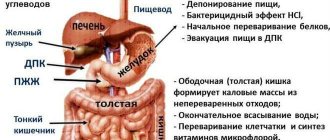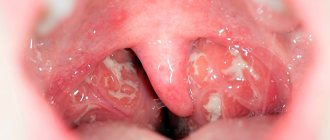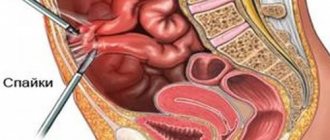Article prepared by:
Vasily Babkinsky
Doctor of the highest category
Intestinal paresis is a disorder that accompanies many diseases and is characterized by a decrease in the tone of the intestinal wall. There is paralysis of the muscles of the organ. If there is pathology, the patient's abdomen swells. The disorder is temporary and may be a consequence of surgery (the deviation may appear 2-3 days after surgery).
With paresis of the intestinal wall, its paralysis occurs
The pathology is associated with a violation of water and electrolyte balance. The disease entails expansion of the food organ and can become the root cause of severe dehydration of the body. Paresis can affect one area or the entire organ. Diagnosis and treatment are complex. If a disorder is present, the patient may require surgery. But, in any case, surgery is indicated if conservative treatment is ineffective. Typically, people over 16 years of age are susceptible to developing the disease.
Causes
Postoperative paresis
Intestinal paresis is one of the most common postoperative complications. Experts believe that this condition is triggered by trauma to the peritoneum, in response to which a protective reaction develops in the form of a decrease in peristalsis activity. Therefore, in most cases, postoperative paresis occurs only after extensive abdominal surgery.
Most often, paralysis develops after laparotomy.
Other
- Inflammatory processes in the abdominal cavity. Massive inflammation of the peritoneum is accompanied by impaired peristalsis of the digestive system, which can lead to intestinal paralysis. Such conditions include peritonitis, phlegmon of the retroperitoneal tissue.
- Impaired blood supply to the intestines. Decreased peristaltic activity may be associated with vascular compromise. The condition is one of the manifestations of acute damage to the heart and arteries, in which blood does not flow into the intestines in sufficient quantities. This disorder may be caused by an abdominal aortic aneurysm or myocardial ischemia (acute coronary syndrome). Vascular disorders can also be local. For example, acute intestinal hypoxia is observed with thrombosis of the mesenteric vessels, which supply blood to the lower parts of the digestive system.
- Violation of the nervous regulation of the intestines. The contractile activity of the digestive system is ensured by the rhythmic impulse of nerve fibers coming from the central nervous system to the intestines. Damage to any segment of the nervous tract can lead to intestinal paresis. This condition can be caused by a tumor or injury to the spinal cord, or by taking certain medications.
- Reflex disorders. Intestinal paralysis can develop in response to any acute disturbances. This may be renal colic, postoperative condition, severe intoxication, severe pneumonia.
We recommend reading:
Intestinal dyskinesia: types, causes, symptoms and treatment methods
Development of intestinal paresis
Intestinal paresis is a condition characterized by low smooth muscle tone. This leads to disruption of the movement of feces. In severe cases, surgical treatment may be necessary. This pathology develops after surgery, against the background of diseases of the lungs, heart and digestive tract. In surgical practice, intestinal paresis accounts for up to 0.2% of all diseases.
The risk group includes older people over 60 years of age. This is due to the presence of chronic diseases and frequent operations. Paresis is often diagnosed in newborns and pregnant women. This condition results in paralytic ileus when half-digested food stagnates.
Main etiological factors
Intestinal paresis is due to various reasons. The following risk factors for the development of this dangerous condition are identified:
- peritonitis;
- phlegmon;
- performing operations on the intestines;
- ischemia due to atherosclerosis or thrombosis;
- abdominal aortic aneurysm;
- coronary heart disease;
- nerve damage due to spinal cord and brain injuries;
- acute cardiovascular failure;
- pneumonia;
- severe pain syndrome (renal colic);
- spinal cord tumors;
- overdose of calcium channel blockers;
- intoxication.
Paresis is based on the following pathological processes:
- disruption of intestinal innervation;
- circulatory disorder;
- reflex reaction.
The human intestinal wall consists of several layers (mucosal, submucosal, muscular and external serous). At the initial stage, paresis of smooth muscle cells occurs. This leads to decreased peristalsis (rhythmic contractions of the intestines). Over time, stool and fluid stagnate. This leads to increased pressure. At the next stage, signs of intoxication of the body appear due to stagnation of metabolic products. Risk factors for the development of paresis include impaired water and electrolyte status.
How does paresis manifest?
With intestinal paresis, symptoms are nonspecific. They resemble inflammatory diseases (enteritis, colitis). The intestines of sick people contract poorly. Local symptoms include moderate pain, flatulence (bloating), nausea, vomiting, and constipation-type bowel movements. Impaired intestinal patency leads to increased gas formation. Patients experience heaviness in the abdomen and bursting pain.
It is diffuse and has no specific localization. Postoperative ileus palsy (PSP) often presents with nausea and vomiting. In the early stages, vomit may contain remains of semi-digested food. Subsequently, the contents acquire a fecal character. This is due to the fact that chyme is thrown into the overlying parts of the gastrointestinal tract.
Intestinal paralysis is manifested by constipation. Severe paresis can be detected during examination of the patient and physical examination. Abdominal pain and bloating are detected. Auscultation reveals the absence of bowel sounds. During a digital rectal examination, the empty rectal ampulla is easily palpated.
Common symptoms include a mild increase in body temperature, rapid heartbeat, decreased blood pressure, shortness of breath, and shallow breathing. Respiratory disorders are caused by displacement of the diaphragm and compression of the lungs and heart. With intestinal paresis in children and adults, fever is a rare symptom.
It indicates the development of complications. In the presence of postoperative paresis with regular vomiting, there is a risk of dehydration (dehydration). This manifests itself as headache and dry mucous membranes. During physical examination, a positive Lothuissen's sign is often determined. When listening to intestinal peristalsis, only heart and respiratory sounds are detected.
Possible complications of paresis
Self-medication and untimely consultation with a doctor are the main reasons for the development of complications. Paresis can lead to the following consequences:
- dehydration;
- blood thickening and blood clot formation;
- ischemia of the intestinal wall;
- perforation (perforation);
- peritonitis;
- acute intestinal obstruction;
- bleeding;
- tissue necrosis;
- formation of diverticula.
If you carelessly use a colonoscope while examining a patient, you may accidentally damage the intestinal wall. The risk of perforation increases if the following symptoms are present:
- paresis lasts more than 6 days;
- increase in intestinal diameter;
- absence of feces for a week.
In severe cases, heart function is impaired. This is manifested by an increase in heart rate and a drop in blood pressure. In the presence of postoperative intestinal paresis, complications are less common. In the absence of proper medical care, death is possible.
Symptoms
- constant nausea;
- vomiting, which in the initial stages contains undigested food residues, after some time can take on a fecal character;
- severe bloating, impaired gas discharge;
- moderate pain without clear localization, which spreads over the entire surface of the abdominal wall;
- prolonged constipation, a small amount of liquid discharge is possible, but its volume is not comparable with the daily norm of feces;
- manifestation of intoxication of the body - fever, shortness of breath, weakness;
- signs of dehydration are dry skin, thirst, lack of urination, tachycardia and decreased blood pressure.
Diagnostics
- Analysis of clinical and anamnestic data. A detailed story from the patient about when the disease appeared and how it developed will help the specialist to assume the presence of intestinal paresis and determine its cause. Of great importance is the presence of concomitant pathologies - vascular disorders or innervation disorders, which can cause the development of paresis. You should definitely check if there is a history of recent abdominal surgery.
- X-ray of the abdominal cavity. The study is the primary way to diagnose paresis. Images of the abdominal cavity reveal fluid-filled loops of intestine. In this case, there should be no signs of organ blockage (mechanical obstruction).
- Ultrasound or multislice CT. The techniques are more specific and informative than x-ray diagnostics. With such an examination, it is possible to analyze the activity of peristalsis and detect increased pneumatization of intestinal loops. Research is also used to identify the causes of paresis of the digestive system.
Leakage in children
Paresis can occur in children for the same reasons as in adults, but since young children cannot talk about their symptoms, it is necessary to pay attention to the following:
- unpleasant and painful sensations in the abdomen cause the child to show anxiety, small children press their legs to their stomach or wiggle them;
- absence of bowel movements, or slight passage of liquid intestinal contents;
- the abdomen is uniformly enlarged and swollen, pain occurs on palpation;
- breathing becomes noisy and frequent;
- Bile may be present in the vomit.
Treatment
General events
After intestinal paresis is detected, a number of general measures are prescribed to reduce the load on the digestive system and improve the patient’s condition. These include:
- removal of intestinal gases using a rectal tube or thick gastric tube;
- food restriction to reduce enteral load;
- relief of the underlying disease that caused the paresis;
- correction of water and electrolyte balance.
Drug treatment
Severe intestinal paresis requires drug stimulation of peristalsis. For this purpose, the patient is administered neostigmine . The drug affects blood circulation, so during its administration the doctor must monitor the patient’s condition. If there is a sharp decrease in heart rate, the patient is given atropine to normalize the heart rhythm.
We recommend reading:
What is traveler's diarrhea, how does it manifest and how is it treated?
If there is no effect from a single administration of the drug, massive infusion therapy with neostigmine is carried out until the effect is achieved (at least 24 hours). The drug has a number of strict contraindications, so a thorough examination of the patient is required before its administration.
Non-surgical decompression
With severe intestinal paresis, the diameter of the organ increases significantly, the pressure in the digestive system increases, which is fraught with a number of complications. Therefore, if conservative therapy is ineffective, the patient undergoes decompression, which helps reduce pressure. It can be carried out using the following methods:
- Insertion of a thick probe into the intestine under X-ray control.
- Evacuation of contents during colonoscopy with the introduction of drainage.
- Percutaneous cecostomy - bringing the cecum to the surface of the abdominal cavity and evacuating its contents.
Colonoscopy is most often used for decompression, since its use has a minimal likelihood of complications.
Surgery
If decompression fails, radical surgery is required. Its volume is determined individually for each patient. In some cases, you can get by with an open cecostomy. In the most severe cases, resection is performed - removal of the affected part of the intestine and anastomosis.
General information
Intestinal paresis is a fairly common manifestation of pathology of internal organs. Thus, paralysis of the muscles of the intestinal wall in 25% of cases develops against the background of acute pathology of the abdominal organs, less often - with severe diseases of the cardiovascular system, lungs, with a generalized infection, endogenous intoxication. Among surgical patients of all profiles, intestinal paresis is diagnosed in only 0.2%. More than 70% of patients with this pathology are over the age of 60 years, so intestinal paralysis is usually considered a disease of old age. Meanwhile, intestinal paresis can also occur in newborns, children of different ages, and pregnant women. Paralytic intestinal obstruction in pregnant women is a very serious pathology, developing in one case out of 50 thousand pregnancies. Most often, this condition occurs in the second or third trimester and is characterized by a high level of danger for both mother and child.
Possible complications
- intestinal perforation;
- fecal peritonitis;
- necrosis of the intestinal mucosa;
- bleeding from the digestive system.
The prognosis for patients with intestinal paresis is determined by many factors: the severity of the disorders, the presence of concomitant diseases, and the patient’s age. In the absence of timely therapy, there is a very high probability of developing complications (primarily perforation and fecal peritonitis), which cause high mortality in this condition.
Concept and code according to ICD-10
Intestinal paresis or ileus is a condition in which the movement of contents through it is disrupted due to a decrease or absence of peristalsis (intestinal muscle tone). Feces stagnate, which leads to intoxication of the body, and in especially severe cases requires surgical treatment.
This pathology is more common in older people who have chronic diseases of internal organs or in patients who have undergone surgery. However, intestinal paresis can occur in newborns, as well as in pregnant women, which is dangerous for both mother and child.
Disease code according to ICD-10:
- K56.0
- paralytic ileus of the intestine, colon, small intestine.
Prevention
- timely consultation with a doctor in the presence of acute conditions;
- proper management of the postoperative period after abdominal surgery;
- maintaining a healthy lifestyle, proper nutrition (see here), reducing stress levels.
In continuation of the topic, be sure to read:
- More about intestinal atony: causes, symptoms and treatment
- Intestinal dyskinesia: types, causes, symptoms and treatment methods
- Atonic constipation: causes, symptoms and treatment methods
- Peristalsis: concept, norm and pathology
- Fiber in human nutrition: benefits, content in foods and dietary supplements
- Methods for improving intestinal motility: nutrition, exercise and medications
- Drugs to improve intestinal motility
- Measures to prevent constipation: diet and other factors
- Intestinal motility: concept, norm and pathology, treatment of disorders
- Exercises for constipation to improve bowel function
Surgery and preventive measures
Cecostomy is a surgical procedure. It is performed quite rarely. In advanced situations, open surgery is performed on the digestive canal.
Often, in case of organ paresis, a colonoscopy with drainage is performed. This type of intervention helps many patients, so a radical technique is performed extremely rarely.
The prognosis for recovery is determined by four main factors:
- timely visit to the doctor;
- prescribing the correct treatment;
- age of the patient;
- the presence of adverse complications.
If a patient experiences intestinal perforation, death occurs in 40% of cases. Even with complete recovery, the disease may develop again. Recurrences most often occur in children, the elderly, and people with weakened immune function.
After treatment, to prevent recurrence of the disease, you need to follow some recommendations.
Prevention of intestinal paresis is as follows:
- physical activity. It is necessary to do exercises and take walks every day. A sedentary lifestyle leads to stool stagnation;
- proper nutrition. It is worth excluding foods that irritate the intestinal walls from your diet. This includes fatty, spicy, fried, salty foods. The diet should include plenty of fiber and lean foods;
- compliance with the drinking regime. The body should receive at least two liters of fluid for an adult;
- giving up bad habits. It is necessary to quit smoking and not abuse alcohol;
- timely detection and treatment of acute and chronic diseases;
- performing operations using laparoscopy;
- prevention of poisoning and injury to the brain and spinal cord;
- treatment of pathological processes with the heart and lungs.
If we talk about paresis in children, then parents should carefully listen to their child. Restless crying, bad bowel movements and restlessness should alert parents. Most often, the pathology at this age is congenital, so the examination should be carried out as early as possible.
Often this pathology develops after surgery on the intestinal organ. Recently, doctors have increasingly begun to prefer endoscopic procedures, as they are safer and no less effective.
The disease can be cured, and its development can also be prevented. It is enough to follow all the recommendations and contact a specialist in a timely manner. The main principles of intestinal health are maintaining a healthy lifestyle, which includes balanced nutrition, physical activity and giving up bad habits.
There are painful conditions of the body, such as constipation or bloating, for which people, as a rule, do not like to see a doctor. However, such symptoms may indicate intestinal paresis, a pathology that accounts for up to 0.2% of the total number of diseases in surgical practice.











